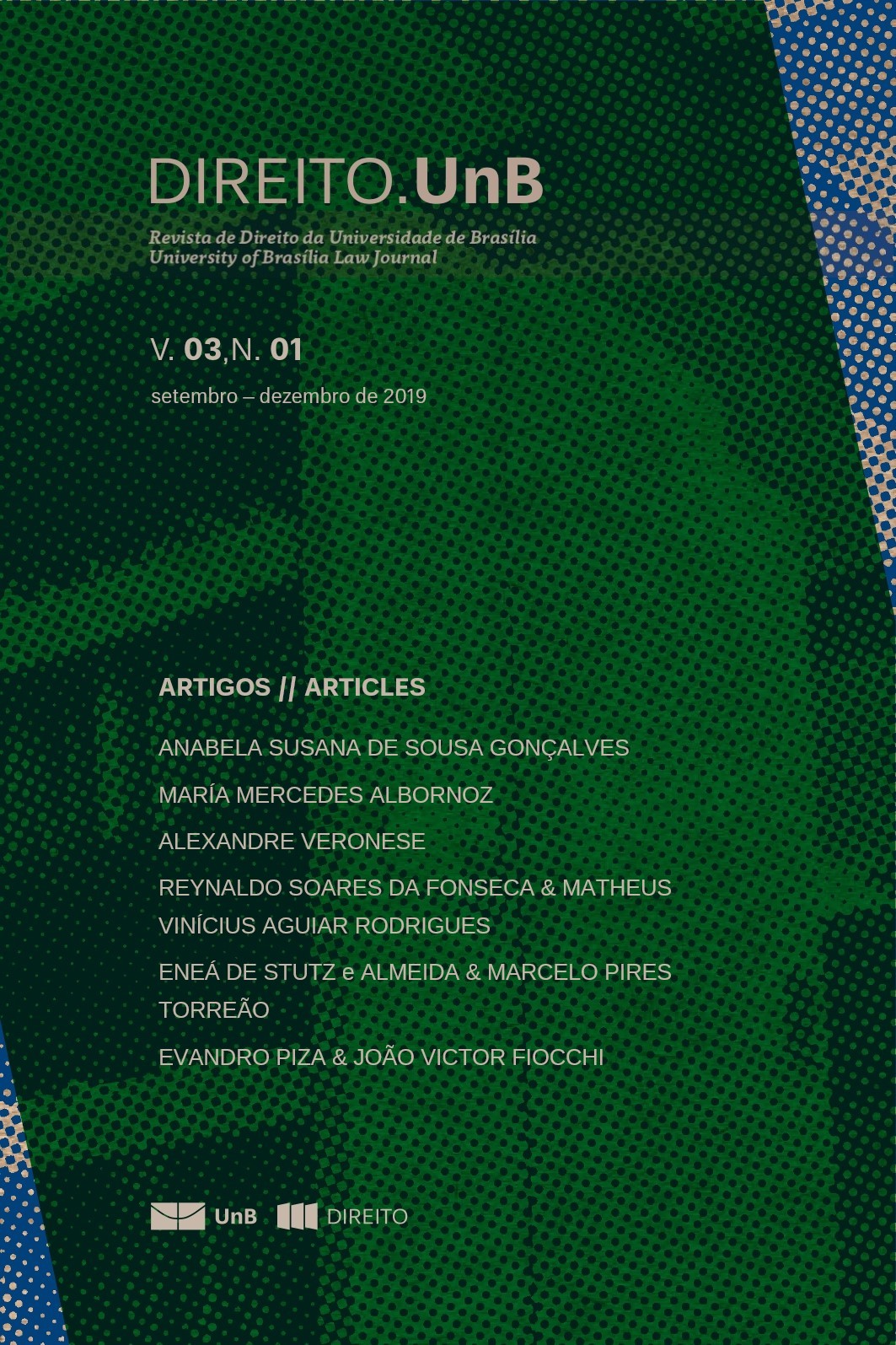Beyond the judiciary: fake news judicial control in the information age
Keywords:
Fake news, Judicial Control, Public Policy, Institutional capacityAbstract
This article seeks to expose an institutional incapacity of the Judiciary, which is a supposed power to control fake news in the Brazilian democracy. In order to do so, at first, we present the main reasons that stimulate and contribute to the resurgence of this social phenomenon, indicating, on the one hand, an architecture that facilitates the dissemination of fraudulent news (echo chambers and filter bubbles) and, for another, a user cognitively predisposed to share it (motivated reasoning account of fake news). In a second moment, when presenting the phenomenon as a legal fact, it is sought to present the main statutes that give rise to the repressive judicial action, that is not able to follow the hyper-speed of propagation of this fraudulent news. Finally, in exposing this institutional incapacity, it is argued that, while limited in its typical function, the Judiciary has little to contribute to the debate. Nevertheless, it is argued that the Judiciary can stimulate public and institutional debates for multisectoral solutions in the regulation and fight against this phenomenon, maintaining, therefore, the hygiene of fundamental democratic values ”‹”‹in a period of democratic recession.
Downloads
References
BARROSO, Luís Roberto. A Dignidade da Pessoa Humana no Direito Constitucional Contemporâneo: Natureza Jurídica, Conteúdos Mínimos e Critérios de Aplicação. Versão provisória para debate público. Mimeografado, dezembro de 2010. Disponível em https://www.luisrobertobarroso.com.br/wp-content/uploads/2010/12/Dignidade_texto-base_11dez2010.pdf. Acesso em 20 out. 2018.
BAVEL, Jay J. Van; PEREIRA, Andrea. The partisan brain: An Identity-based model of political Fake News belief. Trends in Cognitive Sciences, p. 213-224, 2018.
BENVINDO, Juliano Zaiden. A ‘Última Palavra’, o Poder e a História: O Supremo Tribunal Federal e o Discurso de Supremacia no Constitucionalismo Brasileiro. Revista de Informação Legislativa, v. 201, p. 71-95, 2014
BUENO, Thaísa; REINO, Lucas Santiago Arraes. Entre a tabloidização e o teaser publicitário: uma análise dos títulos caça-cliques. Revista Observatório, Palmas, v.4, n. 3, p. 675-707, maio, 2018
DA SILVA, Evandro Rabello. Fake News, algoritmos e democracia: o papel do direito na defesa da sociedade aberta. 2018. 74 f. Trabalho de Conclusão de Curso ”“ Faculdade de Direito, Universidade Federal do Rio Grande do Sul, Porto Alegre, 2018.
DIAMOND, Larry. Facing Up to the Democratic Recession. In: DIAMOND, Larry; PLATTNER, Marc F. Democracy in decline?. Baltimore: Johns Hopkins University Press, 2015.
FOLLONI, André. Introdução à teoria da complexidade. Curitiba: Juruá, 2016.
GOMES, José Jairo. Direito eleitoral essencial. Rio de Janeiro: Forense, 2018.
LESSIG, L. Code: version 2.0. 2006, New York: Basic Books
MARÉS, Chico; BECKER, Clara. O (in)acreditável mundo do WhatsApp. Agência Lupa: Revista Piaui. Disponível em: https://piaui.folha.uol.com.br/lupa/2018/10/17/whatsapp-lupa-usp-ufmg-imagens/?utm_source=meio&utm_medium=email. Acesso em 30 out. 2018.
NEVES, Marcelo. Entre Têmis e Leviatã: uma relação difícil. 3ªEd., São Paulo: Editora WMF Martins Fontes, 2012.
NORTH, Douglass C. Instituições, mudança institucional e desempenho econômico. Tradução de Alexandre Morales. São Paulo: Três Estrelas, 2018.
PENNYCOOK, Gordon; RAND, David G. Lazy, not biased: susceptibility to partisan fake news is better explained by lack of reasoning than by motivated reasoning. Disponível em: 10.1016/j.cognition.2018.06.011. Acesso em 25 out. 2018
SANKIEVICZ, Alexandre. Liberdade de expressão e pluralismo: perspectivas de regulação. São Paulo: Saraiva, Série IDP, 2011
SUSTEIN, Cass R.,#Republic: divided democracy in the age of social media. Princeton: Princeton University Press, 2017
UNIÃO EUROPEIA: Comissão Europeia. A multi-dimensional approach to disinformation: report od the independent: High level group on fake news and online disinformation. Disponível em: https://ec.europa.eu/newsroom/dae/document.cfm?doc_id=50271. Luxembourg: Publications Office of the European Union, 2018. Acesso em> 5 jan. 2019.
VERONESE, Alexandre; FONSECA, Gabriel. Desinformação, ‘fake news e mercado único digital: a potencial convergência das políticas públicas da União Europeia com os Estados Unidos para melhoria dos conteúdos comunicacionais. Cadernos Adenauer, v. XIX, n. 4, 2019.
WARDLE, Clair; DERAKSHAN, Hossein. Information disorder: toward na interdisciplinar framework for research and policy-making. Strasbourg: Council of Europe, 27 set. 2017. Disponível em: https://rm.coe.int/information-disorder-toward-an-interdisciplinary-framework-for-researc/168076277c. Acesso em: 14 jun. 2019

Downloads
Published
How to Cite
Issue
Section
License
Copyright (c) 2019 Direito.UnB - Law Journal of the University of Brasília

This work is licensed under a Creative Commons Attribution-NonCommercial-NoDerivatives 4.0 International License.
Autores que publicam na Revista Direito.UnB concordam com os seguintes termos:
- Autores mantêm os direitos autorais e concedem à revista o direito de primeira publicação, com o trabalho simultaneamente licenciado sob a Licença Creative Commons - Atribuição-NãoComercial-SemDerivações 4.0 Internacional que permite o compartilhamento do trabalho com reconhecimento da autoria e publicação inicial nesta revista.
- Autores têm autorização para assumir contratos adicionais separadamente, para distribuição não-exclusiva da versão do trabalho publicada na Revista Direito.UnB (ex.: publicar em repositório institucional ou como capítulo de livro), com reconhecimento de autoria e publicação inicial nesta revista.
- Autores têm permissão e são incentivados a publicar e distribuir seu trabalho online (ex.: em repositórios institucionais ou em suas páginas pessoais) a qualquer momento após à definição do processo editorial.
- Autores concordam que, eventualmente, seus trabalhos poderão ser agregados pela Revista Direito.UnB às bases e sistemas de informação científica existentes (indexadores e bancos de dados atuais) ou que existam no futuro (indexadores e bancos de dados futuros). Os detentores dessas bases de dados terão a possibilidade de realizar as seguintes ações sobre o artigo:
- Reproduzir, transmitir e distribuir o artigo, no todo ou em parte sob qualquer forma ou meio de transmissão eletrônica existente ou desenvolvida no futuro, incluindo a transmissão eletrônica para fins de pesquisa, visualização e impressão;
- Reproduzir e distribuir, no todo ou em parte, o artigo na impressão;
- Capacidade de traduzir certas partes do artigo;
- Extrair figuras, tabelas, ilustrações e outros objetos gráficos e capturar metadados, legendas e artigo relacionado para fins de pesquisa, visualização e impressão;
- Transmissão, distribuição e reprodução por agentes ou autorizada pelos proprietários de distribuidoras de bases de dados;
- A preparação de citações bibliográficas, sumários e índices e referências de captura relacionados de partes selecionadas do artigo;
- Digitalizar e/ou armazenar imagens e texto de artigo eletrônico.





